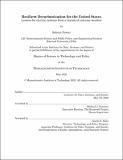| dc.contributor.advisor | Michael J. Kearney. | en_US |
| dc.contributor.author | Pawar, Sohum(Sohum Parag) | en_US |
| dc.contributor.other | Massachusetts Institute of Technology. Institute for Data, Systems, and Society. | en_US |
| dc.contributor.other | Technology and Policy Program. | en_US |
| dc.coverage.spatial | n-us--- | en_US |
| dc.date.accessioned | 2020-09-03T18:47:56Z | |
| dc.date.available | 2020-09-03T18:47:56Z | |
| dc.date.copyright | 2020 | en_US |
| dc.date.issued | 2020 | en_US |
| dc.identifier.uri | https://hdl.handle.net/1721.1/127175 | |
| dc.description | Thesis: S.M. in Technology and Policy, Massachusetts Institute of Technology, School of Engineering, Institute for Data, Systems, and Society, May, 2020 | en_US |
| dc.description | Cataloged from the official PDF of thesis. | en_US |
| dc.description | Includes bibliographical references (pages 159-171). | en_US |
| dc.description.abstract | The past decade has seen an unprecedented surge of climate change-driven extreme weather events that have wrought over $800 billion in damage and taken more than 5,200 lives across the United States -- a trend that appears poised to intensify. At the same time, the need for a large-scale effort to decarbonize the U.S. electric power system has become clear, along with the growing climate risks and impacts that any such effort will face. This thesis argues that the principles of resilience can play a valuable role by enabling the decarbonization of the U.S. electric system, in the face of the escalating risks and impacts of climate-driven extreme weather. By emphasizing targeted hardening, proactive planning, graceful failure, and effective recoveries in the design, operation, and oversight of electric systems in the United States, we can both protect against growing climate risks and catalyze decarbonization efforts -- | en_US |
| dc.description.abstract | an integrated process we call resilient decarbonization. This work seeks to inform present and future resilient decarbonization efforts by examining the lessons of the past decade of extreme weather, and its impact on electric systems in the United States. To do so, we consider three cases: Hurricane Maria, which struck Puerto Rico in 2017, causing the world's second-largest blackout; the 2017-2019 Northern California wildfire seasons, which sent the nation's largest investor-owned-utility into bankruptcy and remain the most devastating on record; and Superstorm Sandy, which served as a wakeup call for the New York/New Jersey area when it made a sudden left turn towards the region in 2012. We find that resilient decarbonization, while a challenging process to set into motion, does in fact meet its dual mission of protecting electric systems against growing climate risks, while enabling their decarbonization. | en_US |
| dc.description.abstract | We also examine the ways in which electric system institutions take climate risks into account, the strengths and weaknesses of resilience-based measures for electric systems, and overarching questions about the role of electricity and electric utilities in American society today. | en_US |
| dc.description.statementofresponsibility | by .Sohum Pawar | en_US |
| dc.format.extent | 171 pages | en_US |
| dc.language.iso | eng | en_US |
| dc.publisher | Massachusetts Institute of Technology | en_US |
| dc.rights | MIT theses may be protected by copyright. Please reuse MIT thesis content according to the MIT Libraries Permissions Policy, which is available through the URL provided. | en_US |
| dc.rights.uri | http://dspace.mit.edu/handle/1721.1/7582 | en_US |
| dc.subject | Institute for Data, Systems, and Society. | en_US |
| dc.subject | Technology and Policy Program. | en_US |
| dc.title | Resilient decarbonization for the United States : lessons for electric systems from a decade of extreme weather | en_US |
| dc.type | Thesis | en_US |
| dc.description.degree | S.M. in Technology and Policy | en_US |
| dc.contributor.department | Massachusetts Institute of Technology. Institute for Data, Systems, and Society | en_US |
| dc.contributor.department | Massachusetts Institute of Technology. Engineering Systems Division | |
| dc.contributor.department | Technology and Policy Program | en_US |
| dc.identifier.oclc | 1191704441 | en_US |
| dc.description.collection | S.M.inTechnologyandPolicy Massachusetts Institute of Technology, School of Engineering, Institute for Data, Systems, and Society | en_US |
| dspace.imported | 2020-09-03T18:47:56Z | en_US |
| mit.thesis.degree | Master | en_US |
| mit.thesis.department | ESD | en_US |
| mit.thesis.department | IDSS | en_US |
